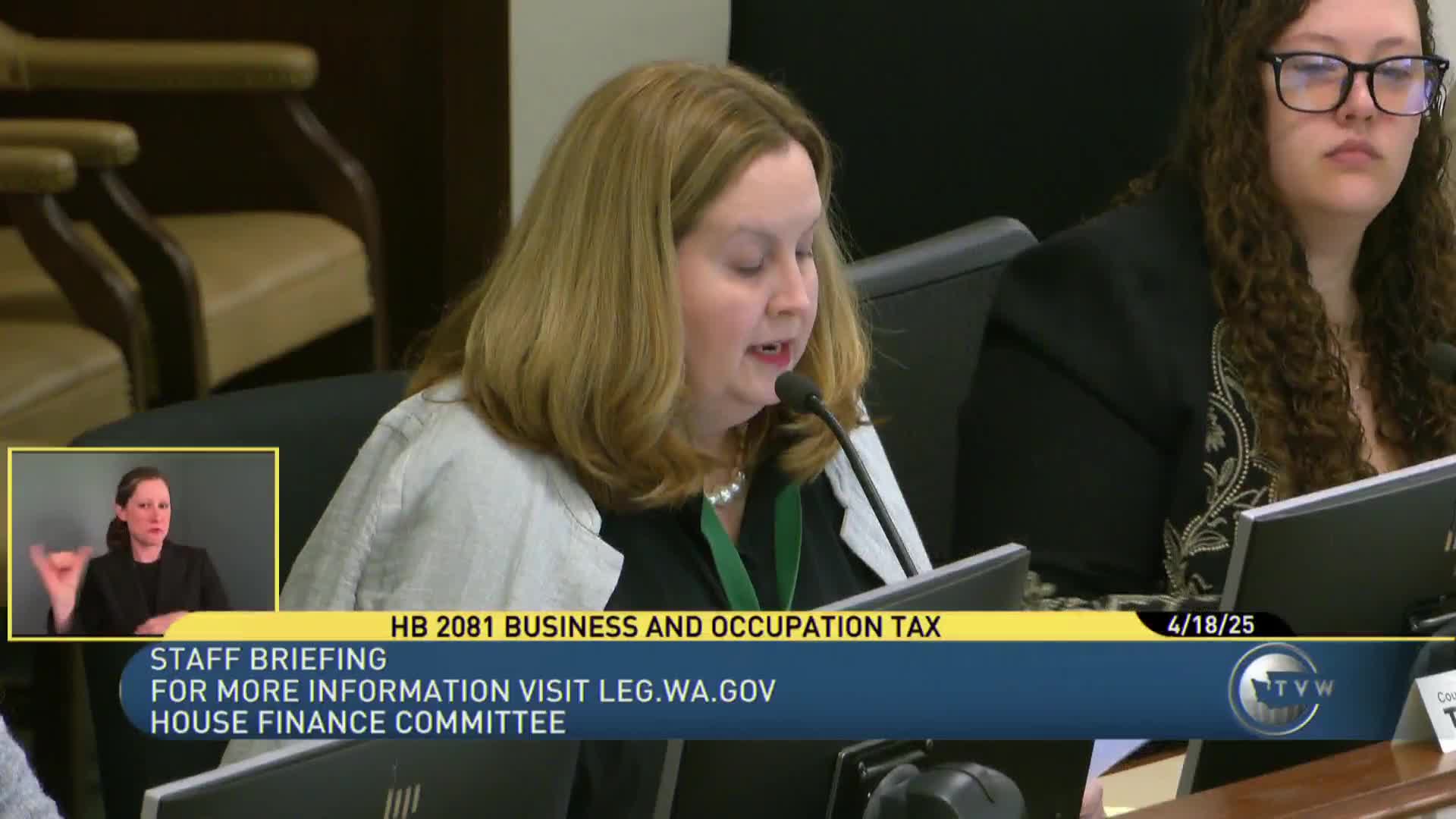House Finance reviews broad B&O changes including surcharge on largest firms, higher advanced-computing rate
Get AI-powered insights, summaries, and transcripts
Subscribe
Summary
House Bill 2,081 would change multiple Business & Occupation (B&O) tax rates and impose a time-limited surcharge on the largest Washington businesses, raise the advanced-computing surcharge and clarify nonprofit investment-income treatment after a state court ruling. Supporters said the bill raises revenue for education and health care; business,
House Bill 2,081 would alter Washington’s business-and-occupation (B&O) tax structure in several ways: raise the services-and-other-activities rate for large businesses, increase several standard rates toward 0.5 percent, impose a temporary surcharge on very large businesses, raise the advanced-computing surcharge and clarify tax treatment of nonprofits’ investment income following a recent state court decision.
Key provisions briefed to the committee include a change that raises the services-and-other-activities B&O rate for businesses with gross income over $1 million to 2.1 percent beginning Oct. 1, 2025. The bill would raise standard manufacturing, extracting, wholesaling and retailing rates to 0.5 percent beginning Jan. 1, 2027, and the advanced-computing surcharge would increase to 5 percent beginning Jan. 1, 2026, with the annual cap on that surcharge raised from $9 million to $50 million.
Part 2 of the bill would impose an additional 0.5 percent B&O surcharge on businesses with at least $250 million in Washington taxable income, effective Jan. 1, 2026; that surcharge would expire Dec. 31, 2030. The bill lists exemptions from that surcharge (for manufacturing-related income, food and prescription drug sales, farmers and beekeepers, and financial institutions that already pay a financial-institution surcharge). The fiscal-note estimates in committee materials projected hundreds of millions to billions in new revenue across the near biennia: staff cited estimated increases of roughly $697 million in fiscal year 2026 and $1.745 billion in fiscal year 2027, with multi-biennial totals in the billions.
Section 4 of the bill addresses uncertainty created by a recent Washington Supreme Court decision (referred to in committee testimony as the "Antio" decision) about whether certain nonprofit investment income is deductible for B&O purposes. Nonprofit advocates said the bill clarifies and restores the exemption for incidental investment income of many 501(c)(3) organizations; some nonprofit witnesses asked the committee to clarify the bill’s effective date and the risk of retroactive audits.
Supporters, including workforce and anti-poverty groups, argued the bill is needed to avoid deep cuts to education, health care and human services. Representative Fitzgibbon, the prime sponsor for portions of the package discussed in committee, said the changes would help close the state’s budget gap and invest in priorities such as education, health care and long-term care. Public testimony in favor focused on preventing cuts to core state services and investing in workforce programs and infrastructure.
Business groups and industry witnesses raised concerns about the economic effects and technical design. Retail groups asked that retailing remain at the lowest available rate and sought an exemption from the surcharge for food and fuel wholesalers; the grocery and hospitality sectors flagged disproportionate effects on essential goods, contests of chance operators and small businesses. The banking industry asked that the financial-institution surcharge not be increased from the current 1.2 percent; banking witnesses warned that piling on taxes could jeopardize capital availability and community-bank competitiveness.
Several industry witnesses — including advanced computing and tech-sector advocates — warned that a higher advanced-computing surcharge and an increased rate burden could push jobs or investment out of state. Health-sector representatives asked that independent health care providers be exempted from proposed rate increases, saying providers do not set billed prices and higher B&O taxes could reduce access to care.
Nonprofit and arts advocates asked the committee to preserve the clarification for nonprofits’ investment-income treatment, while seeking an earlier effective date or assurance the Department of Revenue would not pursue retroactive collections. Committee staff noted the Department of Revenue will need time to update systems; some nonprofit advocates asked for clarity on whether audits could be applied retroactively.
After lengthy testimony from business, labor, education, health and nonprofit stakeholders, the committee adjourned the public hearing on HB 2,081 without a vote and directed staff follow-up on technical questions, including specific definitions and the list of Section 177 states referenced earlier in the ZEV discussion.
